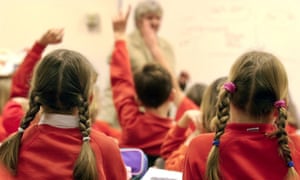Report says students must move from year-based curriculum to one that’s independent of age or grade
Australia’s education system has “failed a generation” of school
children, with student outcomes declining in reading, science, and maths
over the last 18 years, requiring urgent action from government,
according to a landmark report.
A review chaired by businessman David Gonski found Australia needs to
overhaul its “industrial model” of school education, declaring it no
longer helps students maximise their learning growth.
The new report, titled Through Growth to Achievement, makes 23
recommendations around assessment and reporting regimes for federal,
state and territory governments.
Its chief insight is that Australia needs to shift away from a
year-based curriculum to a curriculum expressed as “learning
progressions”, independent of year or age.
It says Australia’s industrial model of school education, which
reflects a 20th century aspiration to deliver mass education to all
children, is detrimental to individual student outcomes because it
focuses on trying to ensure that millions of students attain specified
learning outcomes for their grade and age before moving them in
lock-step to the next year of schooling.
“It is not designed to differentiate learning or stretch all students
to ensure they achieve maximum learning growth every year, nor does it
incentivise schools to innovate and continuously improve,” the report
says.
“Australia needs to review and change its model for school education,” it says.
The report was commissioned by Simon Birmingham, the federal
education minister, after the Turnbull government’s “Gonski 2.0” school
funding plan was passed by parliament last year.
Birmingham will meet state education ministers on Friday to discuss the report. The review’s chairman, David Gonski, will brief ministers.
On Monday the New South Wales education minister, Rob Stokes, said he welcomed the report’s finding that the current Naplan regime in particular is “limited by its focus on achievement rather than growth”.
“The report observes that the best school systems are moving from standardised testing to a mix of more sophisticated evaluation measures,” Stokes said.
“We are shifting from an industrial model of school education that was fit for purpose last century to new, personalised teaching practices to ensure students are equipped to be productive and engaged
Birmingham told Guardian Australia he thinks the report lays out a “comprehensive blueprint for change in the way we look at teaching and school operations”.
The report’s recommendations lean on education researcher John Hattie’s calls for a “year’s growth for a year’s input” in learning. Rather than focusing on assessment measures that focus on high achievement, Hattie says children should receive a year’s learning no matter what developmental level they are at.
The idea has implications for Australia’s model of school assessment because it places less emphasis on the idea that students should be achieving a certain year-level average.
The Gonski report says teachers and educators have long recognised problems with the Australia’s industrial education model, but schools’ attempts to address the issue have been hampered by curriculum delivery, assessment, work practices and the structural environments in which they operate.
“This is compounded by a lack of research-based evidence on what works best in education, the absence of classroom applications readily available for use by teachers, multiple calls on the time of teachers and school leaders, and a lack of support for school principals to develop their professional autonomy and prioritise instructional leadership,” the report says.
It recommends introducing new reporting arrangements with a focus on learning attainment and learning gain, to provide meaningful information to students and their parents and carers about individual learning growth.
It recommends the structure of the Australian curriculum be revised progressively over the next five years to build a roadmap that sets out the steps required in learning for each subject.
It also recommends establishing an independent institution – such as a national evidence institute – to improve the evidence base for educational methods to spread the best teaching practices and programs between schools, states and systems.
The Productivity Commission identified the need for a national education evidence base in a 2017 report that concluded it would “turn best practice into common practice”.

No comments:
Post a Comment